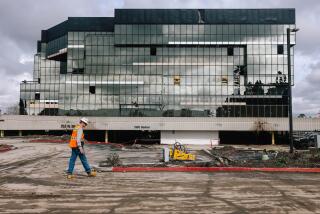Growth Builds on E-Commerce Trend
- Share via
The growth of the Internet has wrought profound changes throughout Southern California’s real estate industry and will produce even greater changes in the years ahead, according to one of the most comprehensive studies to date on the effect of electronic commerce on real estate.
The explosion of Internet commerce will result in far-reaching changes in the ways Southern Californians use real estate--from where they shop to what kind of office space they occupy to what kinds of apartments they prefer, according to the report by Arthur Andersen and Rosen Consulting Group, both based in New York.
Those trends in turn will require adaptations on the part of builders, owners and operators of real estate. Among these trends will be changes in the types of retailers who occupy shopping centers, differences in the types of industrial and office space that tenants demand, and shifting marketing strategies on the part of hotel operators.
In its analysis of the retail sector, the Andersen-Rosen report observes that most homeowners “have no desire to buy nails, paint or kitchen sinks over the Internet,” which could have significant implications for power centers, where specialist retailers maintain giant stores.
“The majority of power center tenants sell commodity products like books, toys and sporting goods, all of which enjoy strong e-business sales,” the report says. It recommends that power center developers, owners and managers who want to keep their properties leased in the future should target such tenants as home improvement chains and other businesses that don’t transfer well to electronic commerce.
“What we’re saying is that there is a good likelihood the power centers will host a different type of tenant, that they are going to have to evolve into different kinds of retail centers,” said Roy Pineci, Los Angeles-based head of Andersen’s Southern California real estate practice.
Another recent report on the effect of e-commerce on the retail sector, issued by Century City-based real estate law firm Cox, Castle & Nicholson, also suggests that there is a future for bricks and mortar.
“The rumors of the demise of traditional retail establishments at the hand of e-commerce have been greatly exaggerated,” said the Cox, Castle report, written by Gary A. Glick and Scott L. Grossfeld.
The authors conclude, “Traditional retail and e-commerce will co-exist, complement each other, thrive, and, together, will create a better shopping experience for the consumer.”
“We definitely believe e-commerce will affect all of real estate,” including the operations of brokerage firms and the choices that corporations make in managing their real estate, said Gary Lenz, a Los Angeles partner who heads Andersen’s worldwide real estate practice.
Lenz said the growth of e-commerce has already wrought significant changes in the types of office space that many tenants require, the structure of office leases and the demand for warehouse space.
The continued growth of e-commerce “doesn’t mean there won’t be a need for real estate,” but it does mean that building owners, developers and managers must recognize the changing role of real estate and adapt in order to survive, Lenz said.
Although e-commerce affects each type of property differently, some trends apply to the real estate industry as a whole, according to the Andersen-Rosen study, which says the Internet “has generally positive implications for real estate.”
Among the study’s conclusions: Location is just as important as it ever was, and access to highways, railroads and airports will remain important, but access to fiber-optic and cable hubs will increase in importance. The upshot is that distribution and logistics companies will continue the trend of building facilities near transportation hubs to ensure quick delivery to customers.
In the retail sector, the report anticipates “several deterrents to the growth of e-business” that bode well for some traditional shopping centers. These deterrents include the high costs of constructing and maintaining online sales sites, the high cost per order of e-business marketing and advertising per order generated, and slow download speeds because of technology limitations.
E-commerce is convenient but “fails to provide the shopping experience many consumers seek” because shopping is a social experience and even a ritualized occasion, for many people, the report notes.
It adds that “e-business denies shoppers the pleasure and often the necessity of physically examining an item before purchase,” and “denies the consumer’s desire for instant gratification which is often at the root of impulse buying.”
The report says this is good news for regional and super-regional shopping malls, which “thrive on the browsing experience and impulse purchases that e-business denies.” According to Pineci, the overall effect of e-commerce on retailing will be that “any commodity-type product that can be delivered efficiently on the Net at a lower cost will be a tremendous challenger to retailers who sell those types of products.”
Despite these effects, e-commerce “is not closing stores, it is opening stores,” the report says, because retailers who have Web sites are expanding their physical presence at an above-average rate. An example: Internet-based Gateway Computers uses physical showrooms around the country to promote online sales.
The industrial sector “can be a clear winner” as a result of the growth of e-commerce, according to the report. It noted that Amazon.com recently spent more than $300 million building warehouse-distribution centers in Nevada, Kentucky, Kansas, and Atlanta, and that the Internet and e-business are generating demand for new types of industrial space.
Warehouses, for example, are increasingly used to perform last-stage assembly, creating a demand for more and larger warehouse-distribution buildings.
But that space “is getting more complicated,” so developers must be prepared to build facilities that are more automated and more sophisticated to accommodate the robots, miniature railways and other technological innovations making their way into the industrial sector. Online grocery store Webvan, for example, is spending $1 billion to build highly automated warehouses in 26 markets nationwide.
In the office sector, the Internet and e-business are especially important to tenants in service-based industries, who demand that buildings be wired for Internet access, e-mail and video conferencing. This means that proximity to fiber-optic hubs that enable faster and higher-quality Internet access and data transmission “may add to property value in the near-term,” the report says.
Office tenants trying to reduce costs have gradually been decreasing the average amount of space they allot per worker, but demand from new Internet and technology companies has more than compensated for this reduction by absorbing existing space and fueling construction of new facilities, according to the report.
Besides increasing demand for office space, e-commerce has created a new type of tenant who wants more flexibility to move into larger space faster. Such companies can go from five employees to more than 100 employees in less than a year.
The hospitality sector gets possibly the most mixed review in the report’s evaluation of the impact of e-commerce.
Web listings “should expand the potential market for many properties, especially independent hotels not affiliated with national chains,” the report says.
However, “pricing pressure on room rates should increase dramatically as travelers and corporate travel agents increasingly use the Internet’s comparative pricing tools when selecting a hotel,” the report notes. There’s also the possibility that overall business travel could be reduced by an increased reliance on telecommunications, e-business and teleconferencing, the study suggests.
The growth of e-commerce will not directly affect the demand for apartments, the report states, but it says the Internet may change some of the ways real estate companies and real estate investment trusts (REITs) operate their properties.
Apartment-leasing Web sites on the Internet can more efficiently match renters with available units by providing photographs and other vital information to prospective renters, according to the report, which says at least one apartment REIT plans to transfer its credit-check and lease-application process to the Internet.
“In the coming years, Internet access will become as commonplace and expected in multifamily properties as a phone jack,” the report says, because renters will demand those services just as tenants in every real estate product sector will demand more technological services.
More to Read
Inside the business of entertainment
The Wide Shot brings you news, analysis and insights on everything from streaming wars to production — and what it all means for the future.
You may occasionally receive promotional content from the Los Angeles Times.










